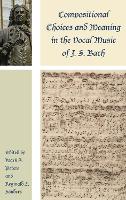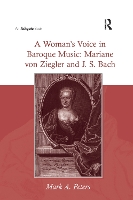Compositional Choices and Meaning in the Vocal Music of J. S. BachAuthor :
Paperback
Published : Monday 6 July 2020
You may also like ...

by
Paperback
06 Jul 2020
>>
€39.77
Extended stock - Dispatch 5-7 days

by
Paperback
28 Nov 2016
>>
€54.21
Extended stock - Dispatch 5-7 days
Description
Compositional Choices and Meaning in the Vocal Music of J. S. Bach collects seventeen essays by leading Bach scholars. The essays explore Bach's sacred vocal music from the perspectives of historical theology, music analysis, the study of parody procedures, and reception history.
Compositional Choices and Meaning in the Vocal Music of J. S. Bach collects seventeen essays by leading Bach scholars. The authors each address in some way such questions of meaning in J. S. Bach's vocal compositions-including his Passions, Masses, Magnificat, and cantatas-with particular attention to how such meaning arises out of the intentionality of Bach's own compositional choices or (in Part IV in particular) how meaning is discovered, and created, through the reception of Bach's vocal works. And the authors do not consider such compositional choices in a vacuum, but rather discuss Bach's artistic intentions within the framework of broader cultural trends-social, historical, theological, musical, etc. Such questions of compositional choice and meaning frame the four primary approaches to Bach's vocal music taken by the authors in this volume, as seen across the book's four parts: Part I: How might the study of historical theology inform our understanding of Bach's compositional choices in his music for the church (cantatas, Passions, masses)? Part II: How can we apply traditional analytical tools to understand better how Bach's compositions were created and how they might have been heard by his contemporaries? Part III: What we can understand anew through the study of Bach's self-borrowing (i.e., parody), which always changed the earlier meaning of a composition through changes in textual content, compositional characteristics, the work's context within a larger composition, and often the performance context (from court to church, for example)? Part IV: What can the study of reception teach us about a work's meaning(s) in Bach's time, during the time of his immediate successors, and at various points since then (including our present)? The chapters in this volume thus reflect the breadth of current Bach research in its attention not only to source study and analysis, but also to meanings and contexts for understanding Bach's compositions.
Reviews